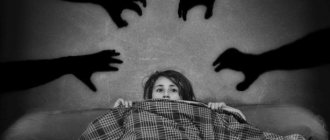Suspiciousness is a character trait of noticing danger in any situation, showing morbid suspicion and distrust. A suspicious person is an individual who possesses the listed qualities. This approach to life is associated with constant experiences and difficulties. Many people, who tend to doubt too much and see the world around them in black, dream of eliminating the obstacle, because it interferes with building interpersonal relationships and a successful career, and achieving goals in other areas. Psychologists will tell you how to get rid of suspiciousness.
Definition and signs
In psychology, suspiciousness is a feeling that is inherent in restless, pessimistic people, which is often associated with anxiety and depressive disorders. A suspicious person is an individual who always assumes danger, regardless of the presence or absence of reasons. In S. Ozhegov’s dictionary, such people are described as fearing everything, seeing in everything an unfavorable outcome for themselves. Other signs that will help you understand what a suspicious person is:
- Takes everything “close to heart”, attaching great importance to little things.
- Takes third-party statements of others personally.
- Excessively worried about himself and loved ones.
A suspicious person is one who, when reading a medical encyclopedia, will definitely discover symptoms of many diseases, which means there is an extra reason for worry. He easily finds reasons for unrest, elevating real and imaginary problems to the level of global, inevitable and insoluble. This condition can accompany an individual throughout his life.
Having heard about the disease of friends or colleagues, he begins to look for similar symptoms in himself. When communicating with a patient, he will certainly discover signs of illness, even if an hour ago he felt excellent. Increased anxiety extends to different areas of life. Typically, a suspicious person finds a reason to worry in everyday situations, which means an unlimited number of potential reasons for fear:
- State of health (your own and those of loved ones).
- Accidents, disasters.
- Criminal attack.
- Secret persecution by intelligence officers.
- Conspiracies of colleagues, neighbors, acquaintances.
Spreading his experiences to those around him, a suspicious person actively cares for and instructs them, often achieving the opposite effect - rejection and irritation due to overprotection. People predisposed to developing anxiety disorders have a characteristic type of appearance. They are distinguished by an asthenic physique, pale skin, their movements are constrained and indecisive.
What is suspiciousness?
Suspiciousness is a pathological tendency to worry about various far-fetched reasons, as well as morbid suspicion and distrust contrary to common sense. This is not a harmless quirk, but a rather dangerous condition for a person that can ruin the life of him and those around him. Anxiety about health, relationships with others, and threats to well-being or social status provoke stress and can lead to chronic mental illness.
A suspicious person is one who sees in his environment more reasons for concern than for joy. He perceives the world as a threat, so he lives in constant fear and is ready to fight back, even if no one attacks. He is tense all the time, even if there are no objective reasons for concern. He strives to control everything because he is convinced that the world around him only brings misfortunes that can happen in the very near future. And if they happen, it will happen to him.
Take a mental health test
In reality, everyone worries and exaggerates, it’s just that suspicious people do it much more often and more intensely. If suspiciousness is a rare condition, good physical activity, swimming, meditation and books on self-development will help relieve the anxiety and tension that accompanies it. If the condition has become a character trait, psychotherapy or taking antidepressants will help.
How dangerous is this and what are the risks?
Fear is one of the leading clinical signs of neurosis. Suspiciousness is a character trait that borders on a disease called neurosis or psychasthenia. The pathology is characterized by the appearance of obsessive anxious thoughts and fears. To determine who is in front of you - a moderately suspicious person or a neurasthenic, you should pay attention to the following symptoms:
- Depression, asthenia, emotional emptiness.
- Decreased performance.
- An ongoing feeling of fear, fear.
- Irritability, emotional lability (sudden mood swings).
- Panic attacks, sudden attacks of anxiety for no obvious reason.
These symptoms are typical for suspicious natures. Patients with neurosis are characterized by the following symptoms: detachment, “withdrawal,” constant anxiety, emotional stress, caution, pedantry, high or low self-esteem. Psychasthenia is often accompanied by headache, tremors (shaking) of the hands, and frequent urination.
Psychasthenia and suspiciousness of a person are conditions that are borderline, which does not exclude the transition from one to the other under certain conditions. If suspiciousness and anxiety take the form of pathology, a doctor will help fight psychasthenia by using methods such as drug therapy (antidepressants, antipsychotics), causal, analytical, conditioned reflex psychotherapy and autogenic training.
Hypochondria is a mental, somatoform disorder that reflects an individual’s excessive concern about his physical health. A hypochondriac is worried about the possibility of getting sick, as well as about an existing or imagined illness. In this case, mental disorder is accompanied by physiological manifestations - increased sweating, tachycardia, rapid breathing.
Somatic symptoms are often secondary, that is, they develop against the background of mental disorders. The hypochondriac does not notice the imaginary nature of the disease, which leads to sad consequences. A person torments himself with far-fetched fears to such an extent that he is capable of committing suicide. For example, historians associate the suicide of Archimandrite (one of the highest monastic ranks) of the Orthodox Church I. Alekseev (1771-1807) with an attack of hypochondria.
Individuals of a certain psychotype are susceptible to the development of hypochondria. Anxious and suspicious personality type is characterized by a tendency to depression and excessive emotional experiences, which leads to changes in behavioral properties, cognitive abilities and physiological functions.
There is a reverse side to the coin. A person who invents imaginary illnesses for himself is a person with a rich imagination and enormous power of self-hypnosis. It is these patients who are particularly susceptible to placebo effect therapy. Any pill for a suspicious patient will become a miracle cure if a doctor prescribes it. It is no coincidence that in the United States they practice treating suspicious people who diligently and persistently look for diseases in themselves with dummy pills.
For example, at a US university they conducted an experiment by selecting a group of volunteers with diagnosed neurotic disorders and inviting them to undergo a course of treatment. It was not hidden from the subjects that the therapy consisted of taking a drug based on regular sugar. By the end of the treatment program, 95% of participants said they felt significantly better.
Most patients were sure that they were given psychotropic substances instead of sugar pills. A third of them noted the appearance of side effects that usually occur after taking such drugs - insomnia, increased thirst, deterioration in concentration. Research in this area was carried out by medical scientists Irving Kirsch, Guy Sapirstein, Jon-Kar Zubieta.
Is it worth fighting suspiciousness?
Psychology is a science that studies in detail what suspiciousness is, how it differs from other conditions, what it means to be suspicious, who is a suspicious person, how to get rid of it or cure a concomitant mental disorder in time. Experts put forward many opinions on this matter, but agree on one thing - a person can drive everyone around him crazy with his suspiciousness. Therefore, it is worth thinking about ways to stop being suspicious.
But it’s not just the people around you – suspiciousness can cause mental disorders. Even if it doesn’t come to this, a suspicious person cannot enjoy life, because strong anxiety about everything prevents him from doing this. “I very much doubt”, “I’m afraid”, “I’m not sure that I will succeed” - a person often repeats these words, which only reinforces his suspiciousness, and in the eyes of others he becomes a grouch.
You need to overcome suspiciousness as quickly as possible. There is one problem here - a suspicious person tries to fight it on his own. This is a big mistake, because it is almost impossible to cope on your own, because you cannot look at yourself from the outside. As a result, even more feelings of fear and anxiety appear.
How to understand that you are suspicious
Anxious suspiciousness develops gradually, which means it is important to distinguish the initial signs, which will help prevent the progression of a mental disorder. If a girl reacts warily to a guy’s compliment, assuming that there is a secret meaning hidden behind a pleasant statement addressed to her, then there is reason to think about how suspicious she is.
Constant dissatisfaction with oneself also signals the presence of a problem. Before you fight suspiciousness and obsessive fears, you need to determine how acutely this issue concerns you and how the problem affects your life. A test task will help identify a tendency to increased anxiety. The purpose of the study is to determine the compliance of your behavior with the presented models:
- The habit of assessing risk underlies all your decisions.
- To prevent danger, you must always think in advance about what might go wrong.
- It is better to expect the worst in order to be mentally prepared for an unfavorable outcome and negative consequences.
- Unpleasant, unusual sensations and pain in the body indicate the presence of a disease.
- You can only trust yourself, because those around you smile in your eyes, but behind your back they weave intrigues and build intrigues.
- If others praise you, it means they need something, otherwise they would not exaggerate your merits.
- Relatives and friends always give reason to worry about them.
It is better to think and take action if you have to agree with at least 2 points from the proposed list. On the other hand, one should not exaggerate the looming danger. Infrequent attacks of inexplicable anxiety are common situations and are characteristic of any living creature.
Breathe deeply!
Many are sure that the reason for suspiciousness is an excess of free time. They say that when you are busy with important work, you have no time to listen to your body. But in reality everything is different. A person cannot do anything if he is in a state of panic, so anxiety deprives us of the opportunity to be distracted. It turns out to be a vicious circle - until a person calms down, he cannot occupy himself with anything other than constant temperature measurements.
A simple technique will help you get out of the vicious circle. As soon as you feel panic rising, it is useful to stop and do breathing exercises - a series of deep breaths and long exhalations. At this moment, try to understand what your fear is talking about. For example, you are consumed by the thought: “I could die from the virus!” Think about what you can do to prevent this: wash your hands thoroughly, don’t forget about medical masks and gloves, try to avoid crowded places. This will help channel your anxiety into a constructive direction and get rid of unnecessary fuss.
Is it your own fault? How we drive ourselves into depression remotely Read more
Causes
To find out how to overcome suspiciousness, you need to understand the mechanism of development of anxiety, depression and fears. Having understood the preconditions for anxiety states, it will be possible to control the process. Main reasons:
- Suffered psychological trauma. The death of relatives, domestic violence, betrayal of a loved one can serve as an impetus for the development of anxiety and depressive disorders. If a child constantly hears from his parents that he is a poor student, can’t do anything, and won’t achieve anything in life, negative subconscious programs are formed that contribute to the development of pathological suspiciousness and neuroses.
- Constant stress. Stressful situations can arise at work, in the family, in society as a whole (for example, due to high crime rates, political and economic instability).
- Low self-esteem. Rejection of one’s “I”, dissatisfaction with oneself and one’s position in society.
Increased anxiety resulting from severe nervous shock can develop at any age. If a passer-by smiled, a suspicious person will perceive a possible manifestation of goodwill as laughing at himself. In this case, signs of low self-esteem are clearly visible, when an individual attributes to himself non-existent shortcomings and shortcomings.
Such people take every random, unflattering word addressed to them, look for and find hidden meaning in ordinary phrases devoid of deep meaning. They often take offense at others, seeing malicious actions and attempts to cause pain in harmless actions. This form is typical for adolescents, who often experience a feeling of uselessness, little significance, and uselessness for no reason.
Typically, women are dissatisfied with their appearance, men are more often dissatisfied with their social status and income level, representatives of both sexes are characterized by dissatisfaction with their chosen one and living conditions. Women are more susceptible to disorders that are accompanied by anxiety and suspiciousness.
Psychologists advise not to focus on personal characteristics and life circumstances that, in your opinion, are far from ideal standards. It is important to understand your individuality and value as an individual, to be content with existing material goods, to look at the world approvingly and then “he will smile back.”
Causes of suspiciousness
Increased anxiety in adulthood often stems from childhood. Low self-esteem and other inferiority complexes are often associated with the obsessive desire of parents to make successful individuals out of their children through harsh upbringing. It is the constant feeling of guilt that acts as the cause of insecurity and weak will.
Instilling in children such qualities as shame, fear and uncertainty is one of the best ways to raise a suspicious person.
Most often, a suspicious state is causeless, and this has been scientifically proven.
The appearance of suspiciousness in adulthood can be associated with various failures in the past. Negative experiences in relationships with other people lead to uncertainty and fear of public attention. This perception of the world around us contributes to the fact that suspiciousness becomes part of the individual’s character. The feeling of fear and obsessions “sit” so strongly in the subconscious that you can only get rid of them with the help of a psychotherapist.
Often, suspicious people suffer from a disorder such as hypochondria, which is characterized as a manic concern for one’s own health. This mental disorder manifests itself in the form of constant “soul-searching” in search of various symptoms, complex and sometimes non-existent diseases. A slight deterioration in health prompts the patient to visit a specialist and conduct a full diagnostic examination of his body. Often, hypochondriacs try to take care of their health on their own, which can negatively affect the patient’s condition . Having read on the Internet about the symptoms of rare diseases, hypochondriacs attribute them to themselves, thereby convincing themselves of the presence of serious health problems.
How to overcome suspiciousness
To understand how to overcome suspiciousness, you first need to recognize the problem. Having realized its presence, you should not indulge in worries; you need to think about what to do to eliminate the harmful character trait. The right attitude is of great importance in the upcoming struggle. The tactic involves replacing obsessive states with positive actions. How to get rid of suspiciousness and anxiety:
- Do yoga and practice other relaxation techniques. Relaxing physical activities relieve nervous tension and strengthen the body.
- Attend auto-training and psychological correction classes. You can remove negative subconscious programs and tune in to health, luck, and positivity with the help of self-hypnosis.
- Find a new hobby, a hobby that will help you take your mind off obsessive thoughts.
- Arrange your personal life. Do not underestimate one of the most significant areas of an individual’s life. Happy relationships with members of the opposite sex are a sure-fire way to constantly be in a great mood. In a state of happiness and “spiritual flight” it is impossible to concentrate on negative emotions and unreasonable experiences. In addition, a loving partner will always support and encourage you in a situation when fears and anxiety come up.
- Build healthy self-esteem and love yourself. Gaining self-confidence is not difficult if you stop focusing on shortcomings and notice advantages and successes, even minor ones.
- Abstract yourself, distance yourself from situations, words, actions addressed to you, which, in your opinion, are aimed at offending and humiliating you. To effectively deal with increased suspiciousness, you need to avoid situations that can provoke emotions such as anxiety and worry. It is better to walk away from an unpleasant conversation than to experience disappointment and unpleasant sensations associated with feelings of hostility, anxiety, and resentment.
Self-development plays an important role in overcoming imaginary fears, because becoming a self-confident, erudite, successful person means taking the first step towards healing the soul and body. A constructive approach to overcoming a problem involves finding solutions.
For example, if you are worried about pain in your side, you can undergo an examination at a clinic to make sure there is no illness and no cause for concern. If anxiety is associated with the fear of losing a job, you can improve your qualifications, at the same time master another profession, a foreign language, new work skills, and set aside a certain amount for a “rainy day.”
Excessive suspiciousness is a depressing, painful character trait that is associated with negative emotions and can lead to depression and serious mental disorders. Advice from a psychologist will help you get rid of obsessive fears and look at reality with a positive message.
How suspiciousness manifests itself
According to most experts in the field of psychology, suspiciousness has three forms of manifestation:
- Heightened self-esteem. In this situation, a person prefers to put his own interests above the needs of others. Synonyms for this type of suspiciousness include words such as “arrogance” and “pride.”
- Problems with making a choice. Suspicious people often have problems making specific choices of actions, fearing that their actions may be a mistake. In such a state, a person tries to relieve himself of responsibility for various actions, and gives the right to make decisions to those around him.
- Increased anxiety. Constant negative experiences regarding future events are another form of suspiciousness. A person suffering from this form of suspiciousness is constantly in a state of anxiety. Various factors can provoke such a condition, including the opinions of others, level of health and social climate.
According to experts, the hypochondriac state has no basis and often appears without a specific reason. The transition to this state is accompanied by distrust of other people, the appearance of obsessions and indecision. The above “symptoms” lead to a significant decrease in self-esteem, causing a person to feel afraid to make decisions that could affect their quality of life. It is in this fear and fear of mistakes that the roots of the problem lie.
All of the above forms of suspiciousness have certain similar features. A suspicious person is a person who has problems concentrating in the objective world around him . Based on the facts given above, one can ask a completely logical question: is a suspicious person aware of the existence of a problem? According to psychologists, there are two main reasons for the appearance of suspiciousness, which are divided by gender and based on the level of socialization of the individual:
- Suspiciousness in men manifests itself due to the fear of various mistakes that can negatively affect their usual life activities. Such fear is born of an incorrect approach to education, when a child is punished for various minor mistakes. This fear, over the years, leads to the fact that a man tries to avoid responsibility and the choice of specific actions.
- Suspiciousness in women is a peculiar habit of giving the right to choose to a man. This problem also has childhood roots, since many girls, faced with various life difficulties, seek advice from adults. Getting used to such “easy” solutions to problems, girls carry this habit into adulthood. Lack of support from such people can lead to stupor when encountering various life difficulties.
Psychologists note that such a division has a certain convention. In practice, both of the above reasons occur in both men and women.
A suspicious person is usually a very suggestible person, obsessed with constant doubts and a sense of fear.
What are suspicious women afraid of?
As a rule, suspicious people turn out to be right in their negative judgments in about 95% of cases... And the point is not at all that suspicious young ladies are more prepared for negative events and see the real state of affairs. One of the immutable laws of life says that we attract into our lives those events that we fear most and about which we constantly think.
What you set your mind to is what you get. Thus, the husband’s constant suspicion of having affairs on the side will ultimately lead to real betrayal with subsequent negative consequences for the woman. It’s just that any normal man will get tired of false accusations, stupid suspicions and unfounded claims, deciding to become what his missus “wants” him to be. If you want a walking man, get it, since you ordered it. And so with any situation.
Are you terrified of getting sick? Well, self-hypnosis will do its job very quickly - soon you will really convince yourself that you are seriously ill, you will even feel the corresponding symptoms of the disease. Suspicious people cannot calmly read medical encyclopedias. After all, in just a few minutes such a person will find a dozen terrible incurable diseases.
Suspiciousness can be expressed in different ways. One woman will worry alone and will not tell anyone about all the bad premonitions. In this case, the lady causes severe harm to her mental and physical health. After all, negativity doesn’t go away, it just slowly undermines the body.
In another case, a suspicious lady will diligently ruin the lives of everyone around her and torment her loved ones with unfounded suspicions. There is even less good here, since everyone around them suffers except the woman herself. Children who grew up next to an overly suspicious mother subsequently adopt her thinking style and suffer from painful uncertainty, fear of failure and many complexes.
Suspiciousness slows a person down, makes him submissive and passive, prevents him from enjoying the beautiful moments of life and trusting loved ones. Suspicious individuals are the worst parents; they literally torment children with their unfounded fears and suspicions.
Is it a disease or a character?
Initially, suspiciousness is a specific character trait. In psychology, a special type of personality is identified - “anxious-suspicious.” Such people are distinguished by excessive mental sensitivity.
They worry more about insults, mistakes and failures. In this case, suspiciousness is a character trait . If this type of personality is regularly exposed to negative factors, then increased mental sensitivity can become a mental disorder.
Only a specialist can define suspiciousness as a disease or character trait through special psychotherapeutic techniques.
An example from the psychological practice of Ekaterina Zhuikova
Wanting to help the child, develop independence, and the ability to cope with their fears, parents send the child alone to the store with the words: “If you don’t buy food, then the family won’t eat.”
An idea, a strong motivation that would have worked for someone else, turned out to be absolutely contraindicated for a suspicious child. As a result, he fell into severe anxiety and generally refused to leave the house for some time.
____________________
If your child is a “quiverer”, then he needs a special approach - with respect for his inner world, which may not be completely understood by adults.
It is unacceptable to devalue this inner world: “What kind of microbes are there!” or “What could happen to you on the street!”
Of course, the recommendation “not to devalue” is true for any child (and even an adult), but when dealing with anxious children, failure to adhere to the principle of valuing the inner world is fraught, because it is too destructive for such children.











